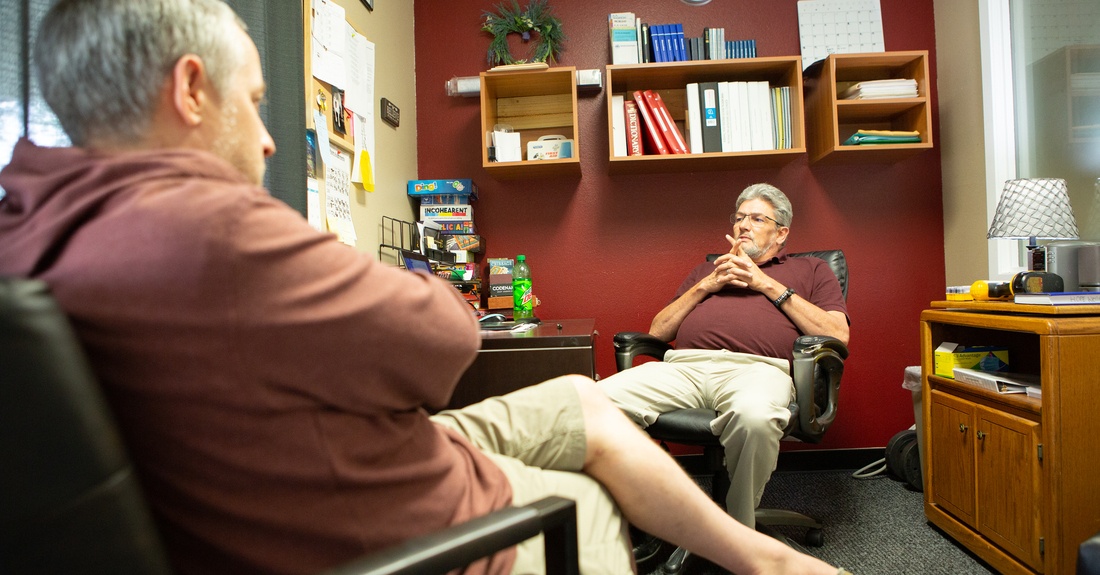
Finding the proper mental health support is key to feeling more balanced and well. From therapy and counseling services that empower individuals with skills to cope to community-based services that foster a sense of connection, Heart of Iowa Community Services is ready to guide you through the complex terrain of mental health support. We also share four types of mental health crises and how to support someone unwilling to seek help. Though reading this blog will give you a good start, you can always call Heart of Iowa for additional support.
What Are Some Resources Available to Individuals With Mental Illness?
Mental health support resources can vary based on needs, preferences and the specific nature of the mental health condition. These three sources of support are broad and can be tailored within each to meet the individuals seeking help with mental health issues where they are.
- Therapy and Counseling Services: Therapy can be valuable when the professional guidance and emotional support resonates with the individual receiving care and is offered in a confidential, safe environment. Individual, couples, family or group therapy are options to explore. Teletherapy and therapy apps can provide therapy services via video or phone.
- Psychiatric Services: These services often include medical interventions based on psychiatric evaluations by psychiatrists, who are medical doctors. Evaluations reveal underlying biological factors impacting mental health, allowing psychiatrists to accurately diagnose and prescribe medication to appropriately address the concerns.
- Community-Based Services: Support groups, educational programs, nonprofit programs, and other forms of connection and counseling through community services are often more accessible and affordable. Community-based organizations can offer a range of mental health services. Here are a few from the Heart of Iowa resources guide:
- Adel Mental Health
- Children and Families of Iowa
- Mid-Iowa Family Therapy Clinic
- Southwest Iowa Mental Health
- Perry Networkers, a resource for mental health professionals and others who work in human services
These resources are usually staffed 24/7 to provide immediate access to counselors via phone or chat. Spanish-language services may also be available.
Contact us to see how HICS can best serve you.

What Support Would Be Given to Someone With Mental Health Concerns?
Support for someone who is experiencing a mental health concern can vary based on the person and the concern they’re facing. Emotional support from friends, family and people who interact with them regularly can play a crucial role in creating a socially healthy environment that promotes mental well-being. Offering understanding and expressing empathy can impact someone who is on a journey toward improving their mental health or overcoming a mental health diagnosis.
Other types of support include professional support — therapy, counseling, medication — which can provide specialized care, and peer support, where support groups connect those who are experiencing a mental health condition with others who have experienced similar challenges or diagnoses.
What Are the Four Types of Crisis in Mental Health?
A mental health crisis is a person’s subjective reaction to a stressful life experience that compromises their ability to cope or function. People with a diagnosed mental condition or illness are at greater risk of experiencing a crisis; however, crisis often occurs before the illness or condition has been identified.
Wild Iris Medical Education says the four types of crises in mental health can be categorized as maturational, situational, adventitious or sociocultural — and individuals can experience more than one type simultaneously.
- Maturational Crisis: Also known as developmental or normative, maturational crises can happen during any transitional period in growth and development throughout life, from infancy to adulthood. When a person grows into a new stage of life, former coping strategies may not be appropriate and new strategies may not yet be known or developed — leading to increased anxiety or stress and other behavioral changes.
- Situational Crisis: Accidental or external events like a divorce, loss of a child or disfiguring injury could be sudden, unanticipated and unavoidable causing crisis to stem from a change in a person’s identity, role or established environment.
- Adventitious Crisis: Events of disaster are rare, unexpected happenings that are not part of everyday life. Because of their severity, normal coping strategies may not be effective and usual support systems may not be available which can lead to crisis.
- Sociocultural Crisis: Though this type of crisis can take many forms, it often involves a fundamental change or challenge to a person’s values, belief system or way of life that defines them (like the COVID-19 pandemic).
What To Do if Someone Is Mentally Unstable and Won’t Get Help
Call or text 988 if someone you know is mentally unstable or experiencing a mental health crisis and you don’t know how to move forward. You’ll be connected with a crisis counselor who can assist you in supporting someone who is experiencing suicidal thoughts or emotional or mental distress. You can also start by following these 10 steps to support individuals facing a mental health crisis.
- Ensure physical safety and emotional stability. Determine the immediate safety of the person and those around you. If there is an imminent risk, call 988 or emergency services.
- Remain calm and reduce intensity. To avoid further deterioration of the person’s mental status and to prevent long-term effects, do your best to reduce the intensity of the emotional, mental, physical and behavioral reactions. Be calm and offer a nurturing response that expresses your concern.
- Ask what they need. Ask the person if they want you to only listen or if they want you to also provide guidance or support. Respect their preferences and boundaries while also maintaining safety.
- Actively listen. Provide a safe, judgement-free space for them to express their thoughts and feelings. Provide verbal awareness to show interest, like “I see,” and “Really?” Nonverbal awareness is also important: Face the person, have an open posture, lean toward them and maintain eye contact.
- Ask clarifying, open-ended questions and restate. Ask questions for understanding and use restating and paraphrasing to show you heard what the person has said.
- Share a personal experience in asking for help. Understand the reason behind not wanting to seek help and offer a personal experience where you sought help. Let them know about others who have benefitted from professional support. Personal stories can reduce stigma and provide hope.
- Help them connect. Seek out opportunities for them to improve their social health and well-being by going with them to support groups or connecting them to local resources. If you are not a medical professional or licensed therapist, encourage them to seek one out and offer to find a counselor or therapist on their behalf. No matter the need, Heart of Iowa Community Services can help. Funding is our concern, not yours.
- Be patient. When it comes to other people and their mental health, you can’t control how long it will take to recover. The process is different for every person experiencing a crisis. Improvement will take time.
- Do your research. Knowing more about the specific mental health condition the person is experiencing can help enhance your empathy and help you develop crisis prevention strategies to support this person again in the future, if needed.
- Follow up. After the immediate crisis or initial conversation, check in with the person regularly. While ongoing support can be a great resource for them, it can be a source of stress for you. Express expectations and boundaries upfront and ensure you take care of your mental health.
Navigating the diverse landscape of mental health support services can be overwhelming because there’s no single path to wellness. Heart of Iowa Community Services brings together the best of Iowa’s community health and human services resources in three central Iowa counties, providing guidance to make informed decisions about care for yourself or others. We can directly connect you with the right service provider and offer financial assistance for qualified applicants. We’re here when you’re ready to take the next step.
